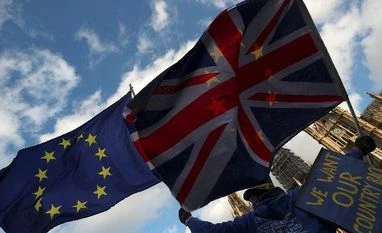An online petition seeking to reverse Brexit hit the 1-million mark on Thursday after a flurry of signatures following British Prime Minister Theresa May's latest intervention announcing that she would be seeking a short delay on the March 29 Brexit deadline.
The sudden deluge of signatures attracted by the Revoke Article 50 and remain in the EU' petition crashed the Parliament's petitions site as May arrived in Brussels on Thursday for a two-day European Council meeting, where she will canvas EU leaders for a "short delay" to Brexit until June 30.
"A short extension gives us that opportunity to decide to leave the European Union, to deliver on that result of that referendum and I sincerely hope that will be with a negotiated deal," she said from Brussels, a day after she addressed the nation from Downing Street to lay the blame for the delay squarely on British MPs.
"You are tired of the infighting, tired of the political games and the arcane procedural rows, tired of MPs talking about nothing else but Brexit You want this stage of the Brexit process to be over and done with. I agree. I am on your side, she said in her statement.
It invoked fury among her own MPs and from across party lines, many of whom blamed her leadership over Brexit and were among those sharing a link to the anti-Brexit online petition on social media.
The petition reads: "The government repeatedly claims exiting the EU is 'the will of the people'.
"We need to put a stop to this claim by proving the strength of public support now, for remaining in the EU. A People's Vote may not happen so vote now."
The UK Parliament considers all petitions that get more than 100,000 signatures for a debate, which means the petition now qualifies and might be among those listed for a parliamentary debate in coming days.
Also Read
However, House of Commons leader Andrea Leadsom, herself a Brexiteer, dismissed the petition as not being on the same scale as the pro-Brexit vote in the June 2016 referendum, when 17.4 million people voted to leave the EU.
"Should it reach 17.4 million respondents then I am sure there will be a very clear case for taking action," she told MPs.
In December last year, the European Court of Justice had ruled that the UK can unilaterally revoke Article 50 of the Treaty of the European Union the formal mechanism which the UK had invoked after the 2016 referendum triggering the two-year timeline for its exit by March 29. This means the UK can decide to stay in the EU without the consent of the 27 other member states.
Meanwhile, unless May succeeds in securing a delay to the Article 50 Brexit mechanism which must be agreed unanimously by all other 27 member-states of the European economic bloc Britain is in danger of crashing out of the EU without any deal in place. Unless the law is changed in time, the UK must leave the EU next Friday and the default legal position would mean an exit without any border and other arrangements in place.
May is hoping to have a third try at getting MPs to back her EU withdrawal deal in a Commons vote next week, after it was rejected twice over the controversial Irish backstop clause.
Meanwhile, a cross-party group of MPs are trying to give the UK Parliament control of Brexit by seeking a series of "indicative" votes on alternatives to the British PM's deal in the House of Commons.
Reflecting the wider European view, Chancellor Angela Merkel said the EU could meet May's request to delay Brexit if in the next week there was a "positive vote" on the withdrawal agreement in the UK Parliament. Ireland's Indian-origin Prime Minister Leo Varadkar echoed the sentiment, adding that there was "openness to an extension" as nobody wants a no-deal Brexit.
Brussels remains open to a longer extension, although May has indicated that she will resign if MPs demand a significant delay to the withdrawal process and the UK is forced to contest the EU elections scheduled for May 23.
The EU heads of state and government will hold a discussion on Thursday afternoon after being addressed by Theresa May, and will have to agree unanimously on any extension on March 29 to be written into their European Council summit communique.
)